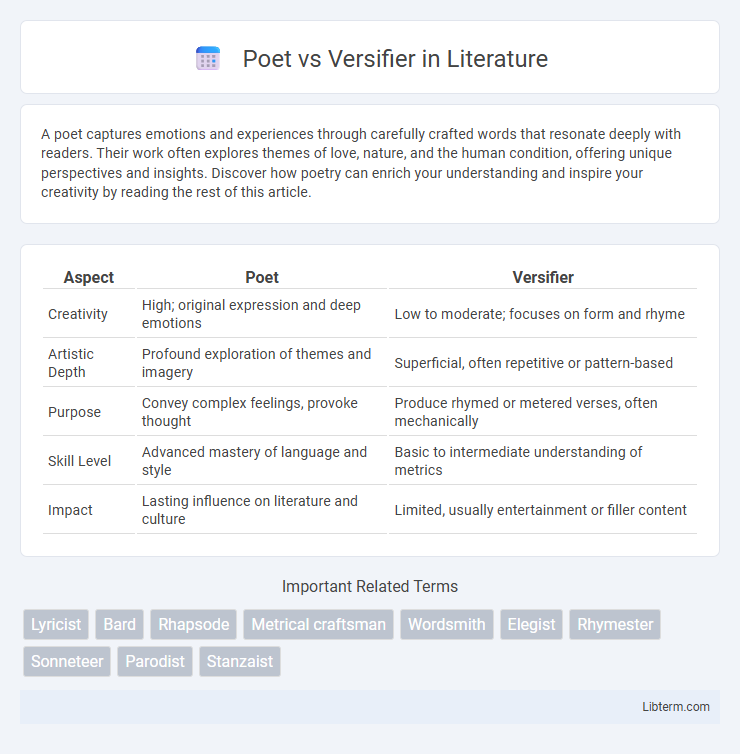A poet captures emotions and experiences through carefully crafted words that resonate deeply with readers. Their work often explores themes of love, nature, and the human condition, offering unique perspectives and insights. Discover how poetry can enrich your understanding and inspire your creativity by reading the rest of this article.
Table of Comparison
| Aspect | Poet | Versifier |
|---|---|---|
| Creativity | High; original expression and deep emotions | Low to moderate; focuses on form and rhyme |
| Artistic Depth | Profound exploration of themes and imagery | Superficial, often repetitive or pattern-based |
| Purpose | Convey complex feelings, provoke thought | Produce rhymed or metered verses, often mechanically |
| Skill Level | Advanced mastery of language and style | Basic to intermediate understanding of metrics |
| Impact | Lasting influence on literature and culture | Limited, usually entertainment or filler content |
Defining the Poet: More Than Words
A poet transcends mere wordsmithing by imbuing language with profound emotion and insightful meaning that resonates deeply with readers. Unlike a versifier, who primarily focuses on rhyme and meter, a poet crafts imagery and symbolism that evoke complex human experiences and universal truths. This distinction highlights the poet's role in transforming language into an art form that captures the essence of life beyond structured verse.
Who Is a Versifier? Structure Over Soul
A versifier is someone who focuses primarily on the structure and form of poetry, often prioritizing rhyme, meter, and technical precision over emotional depth or originality. Unlike a poet who imbues verses with soul and expressive meaning, a versifier tends to produce compositions that are mechanically correct but may lack profound artistic insight or genuine feeling. This emphasis on formal constraints reflects a commitment to craft rather than the creative essence that distinguishes true poetry.
Creativity vs. Craft: Key Differences
Poets channel profound creativity by weaving emotions, imagery, and original ideas into their work, while versifiers emphasize technical skill by adhering to structured meter and rhyme schemes. The poet's role is to evoke deep feelings and provoke thought through innovative language, whereas the versifier prioritizes the craftsmanship of form and consistency. This distinction highlights creativity as the essence of poetry, contrasting with versification's focus on the disciplined art of construction.
Depth of Meaning in Poetry
A poet crafts verses with profound emotional depth and layered symbolism, inviting readers to explore complex human experiences and universal truths. Versifiers often concentrate on rhyme and rhythmic patterns, prioritizing form and structure over emotional resonance or thematic complexity. The distinction lies in the poet's ability to convey rich meaning through imagery and metaphor, transcending mere technical skill characteristic of versifiers.
Emotional Resonance: Poetical Impact
Poets evoke deep emotional resonance through vivid imagery, metaphor, and rhythm, creating profound poetical impact that transcends mere words. Versifiers often prioritize form and structure over emotional depth, producing technically correct but emotionally flat compositions. The true emotional power lies in a poet's ability to connect with the reader's inner experiences, transforming language into an immersive, affective journey.
Technique and Form: Versifier's Domain
Versifiers excel in strict adherence to established poetic forms, employing precise meter, rhyme schemes, and structured verse patterns to create rhythmically consistent and formulaic poetry. Their technique emphasizes mechanical skill and replication of traditional templates, often prioritizing form over emotional depth or innovation. This disciplined approach ensures clarity and predictability, distinguishing versifiers from poets who favor expressive freedom and inventive use of language.
Historical Perspectives: Poet vs Versifier
Historically, the distinction between a poet and a versifier has centered on creative originality and emotional depth; poets are revered for their imaginative expression and ability to evoke profound sensations, while versifiers are often seen as craftsmen who adhere to formal structures without necessarily conveying deep meaning. In literary traditions from the Romantic period onward, poets gained recognition as visionary artists, whereas versifiers were considered skilled technicians focused on meter and rhyme. This dichotomy reflects evolving cultural values around artistry, authenticity, and the purpose of poetry in society.
Influence on Literary Movements
Poets have profoundly shaped literary movements by pioneering innovative styles and embedding deep emotional and philosophical themes, as seen in Romanticism and Modernism. Versifiers often contribute to the formal aspects of poetry, emphasizing meter and rhyme without necessarily advancing the thematic depth or cultural impact. The distinction between poets and versifiers highlights how artistic vision drives transformative literary trends beyond mere technical skill.
Critical Reception and Public Perception
Poets are often critically acclaimed for their ability to evoke deep emotions and craft original, profound imagery, earning respect within literary circles for innovation and artistry. Versifiers, while skilled in meter and rhyme, are sometimes perceived as producing mechanically structured work lacking the depth valued by critics and the public alike. The distinction highlights a prevailing preference for creativity and thematic complexity over technical proficiency in both critical reception and popular appreciation.
Which Matters More Today?
Poet and versifier roles differ significantly, with poets creating profound, original expressions that resonate emotionally and culturally, while versifiers often produce technically correct but superficial rhymes. In today's literary landscape, the depth and authenticity of a poet's voice matter more, as audiences seek meaningful connections and insightful reflections rather than mere rhythmic patterns. The enduring value lies in poetic innovation and emotional impact, overshadowing the mechanical skill of versification.
Poet Infographic

 libterm.com
libterm.com